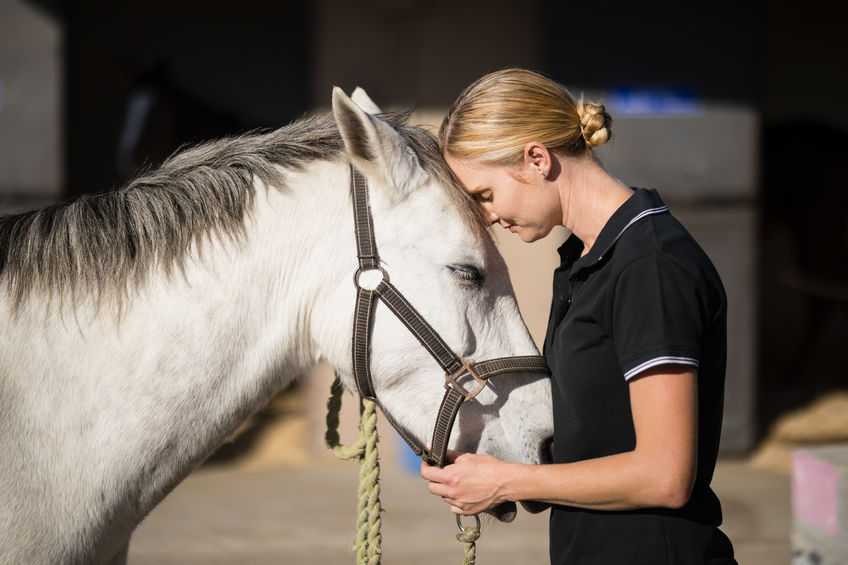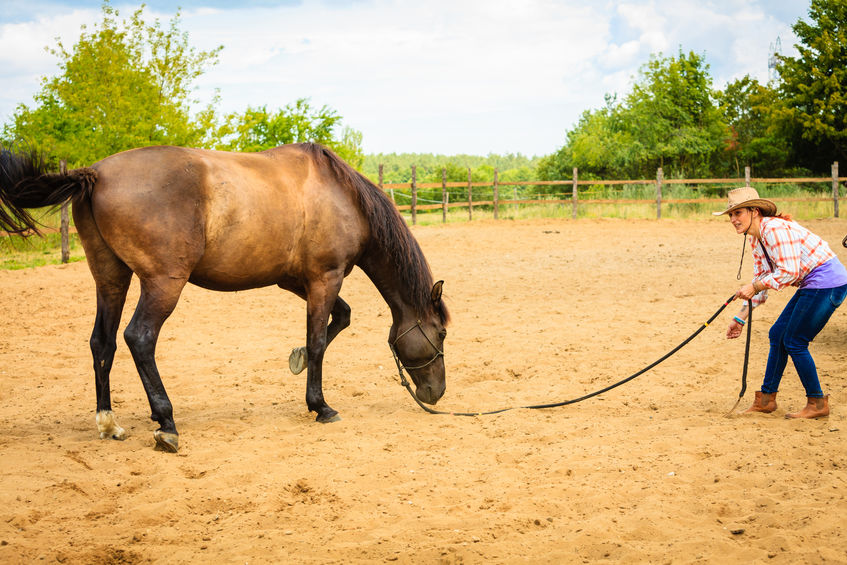 Just like humans or any other animal, horses sometimes experience anxiety. There are a lot of reasons your horse may feel stressed or nervous, such as a new environment, sudden noise or other sensation, unfamiliar person, or even a new object in their path. As their handler and loving owner, it falls to you to help your horse understand their stressor and either remove it from their environment or teach them it is nothing to fear.
Just like humans or any other animal, horses sometimes experience anxiety. There are a lot of reasons your horse may feel stressed or nervous, such as a new environment, sudden noise or other sensation, unfamiliar person, or even a new object in their path. As their handler and loving owner, it falls to you to help your horse understand their stressor and either remove it from their environment or teach them it is nothing to fear.
Working with an anxious horse can be a little intimidating if you don’t know what you’re doing, for fear that they’ll act out physically and unintentionally harm you, themselves, or others nearby. But if you follow the simple techniques below, you can have your horse feeling calm and relaxed in no time!
First, learn how to recognize anxiety in your horse.
When you’re able to spot signs of anxiety in your horse early, you can act quickly to calm them and prevent a heightened situation. Your horse’s primary methods of communication are their actions and their body language. Pay attention to their behavior, so you know when it’s time to employ your calming techniques. A few common signs of horse anxiety to watch for include:
- Stall or fence walking
- Teeth grinding, chewing, or biting
- Bucking or rearing
- Pawing
- Tail wringing
- Colic symptoms
- Trembling
- High pulse
- Fast breathing
- Sweating
Reassure your horse verbally.
Your presence alone can be a reliable, steady comfort for a horse you own or handle frequently. Using your familiar voice to remind them that you’re right there with them can be reassuring for both you and them. Speak to your horse in low, soothing tones to help you both relax—the calmer you are and seem, the more comforting it will be to your horse.
Give them a familiar cue.
Redirect your horse’s energy into something that feels safe and familiar by giving them a job they know well. If you’re riding and notice they’re starting to paw or tremble, for example, have them trot or run a drill they’re used to practicing. Giving an anxious horse something else to focus on can help distract them from their anxiety for long enough to let it settle.
Help your horse face their triggers slowly.
If your horse’s stressor is something they won’t have to encounter again or regularly, the best course of action is to simply remove it from their environment. If they’re triggered by something they’ll have to get used to being around though, such as tack or a new stall mate, you need to acclimate them little by little.
Let your horse inspect the object of their anxiety to learn that it’s nothing to be afraid of. Help them get used to the look, smell, and overall presence of their trigger by working with them consistently one-on-one until they no longer react.
Don’t make a big deal of anxiety.
More than anything else, your horse is going to follow your lead when it comes to reacting to something in their environment. If you ignore something that’s starting to trigger them, they will likely come to see that it’s something they can ignore too. Similarly, responding to their anxiety with a lot of fuss will only validate their overreaction. Instead, just stay calm and ride quiet and slow. Show your horse there’s nothing to be afraid of and no grounds to be anxious.
An important aspect of preventing and managing anxiety in your horse is to provide them with a safe, reliable home to retreat to when they’re in need of comfort. With a portable horse barn or run-in shed from Deer Creek Structures, they’ll have the protection and reassurance they need to take on the world with you.
Contact the Deer Creek team today to learn more about our pre-built structures and custom barn options!

